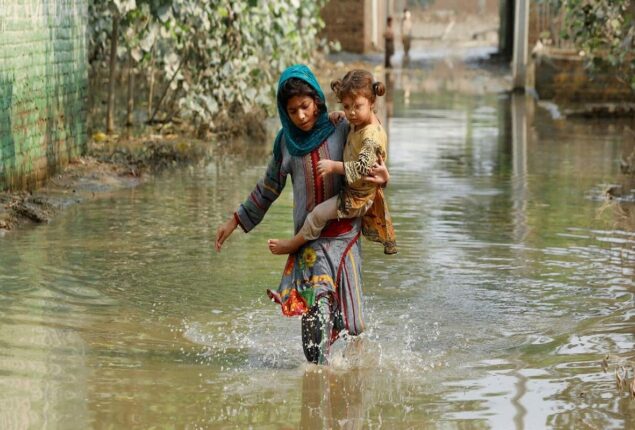Pakistan to face $1.5bn losses from floods each year: ADB report
ISLAMABAD: Asian Development Bank (ADB) has warned that floods are expected to...

Concerns for newborns affected by Pakistan’s terrible floods
When Kainat Solangi’s daughter was born on August 14, it was pouring. Since then, it hasn’t stopped much, leaving her family stranded in a temporary tent on a small patch of land surrounded by Pakistan’s worst-ever floods.
The eight-member family in the village of Rijepur, southwest Sindh province, constructed their shelter out of furniture and textile sheets that they were able to rescue from their flooded home. Rijepur is close to Khairpur Nathan Shah.
Solangi said she fears for Shumaila, her 24-day-old baby, whom she brought home from the hospital as it rained because she couldn’t afford to pay for her medication.
She and her other five kids are now in need of food, ailing, and protection from the snakes that are also hunting for food and higher ground. Her husband, who makes a living every day, is disabled.
All of the wealthy people left the village, but we stayed since we couldn’t afford to go. Money is everything, she declared. “We are powerless beings. I’ve had a fever and a throat infection for the third month in a row, therefore I’m unwell as well. Even purchasing certain medicine is beyond our means.
According to the World Health Organization, women and children have been disproportionately impacted by Pakistan’s devastating floods as a result of limited access to healthcare.
According to Dr. Palitha Gunarathna Mahipala, the WHO representative for Pakistan, almost 10% of the nation’s medical facilities have been harmed by the floods. He stated that among the tens of thousands of displaced individuals, there are 1.2 million pregnant women.
Despite having survived the delivery of her child, Solangi is aware that an infant should not be left on a narrow strip of land between floodwaters. However, she claimed that compared to a nearby relief camp that is only accessible by boat, she feels safer there.
The relief camp has nothing, she declared. “People have no power. People receive nothing from them. Living here is better, she declared.
While they wait for the waters to recede, people all around Pakistan, including Solangi, are making do on food dropped by charity workers. Together with Solangi, about ten households are crammed onto the narrow strip of land that is occasionally about 15 feet, or less than five met, broad.
While the kids are sleeping, flies buzz around their faces, and it’s difficult to escape mosquitoes that carry the risk of malaria, which can result in fever, flu-like symptoms, and occasionally even death.
We were promised mosquito nets by a woman who came here, but she never returned, according to Solangi. “I continue to wait for that. They registered my name as well, but she never showed up.
Mahipala claimed that the WHO was observing “malaria of epidemic proportions” and noted an increase in typhoid cases and infections of the skin, eyes, and respiratory system.
As water advances towards the south of the country, he warned, “we believe that scenario would worsen with the bigger humanitarian and public health impact, particularly in Sindh province.”
Since certain locations are too difficult to access, the actual number of individuals living in displaced persons camps may be higher than the WHO’s estimate of 634,000.
Children play along with the cattle families who were spared from the flood on the dirt strip while splashing around in the water that has now engulfed their tiny community.
The 70-year-old Mai Haleema keeps an eye on them, especially while they are sleeping. She worries that the younger kids won’t remember where they are and will unintentionally stumble into the water, which is only a few feet away from their beds.
“This area has been hit by floods four times in my life, but I remember three of them. But this time, the heavy rains worsened the situation. The water level was not so high in the past,” Haleema said.
She worries about the future, but doesn’t think too much about her damaged home – “It is useless to cry for it now,” she added.
She and Solangi are more concerned about the kids and how they’ll get through this than anything else.
Haleema stated, “We need to store food for our kids.” “God could aid us.”
Solangi is also praying on God to intervene to spare them from a catastrophe that no one anticipated.
God is our rescuer. I don’t feel well,” she admitted. “My kids are ill as well. I have to go get some water.
Catch all the World News, Breaking News Event and Latest News Updates on The BOL News
Download The BOL News App to get the Daily News Update & Follow us on Google News.